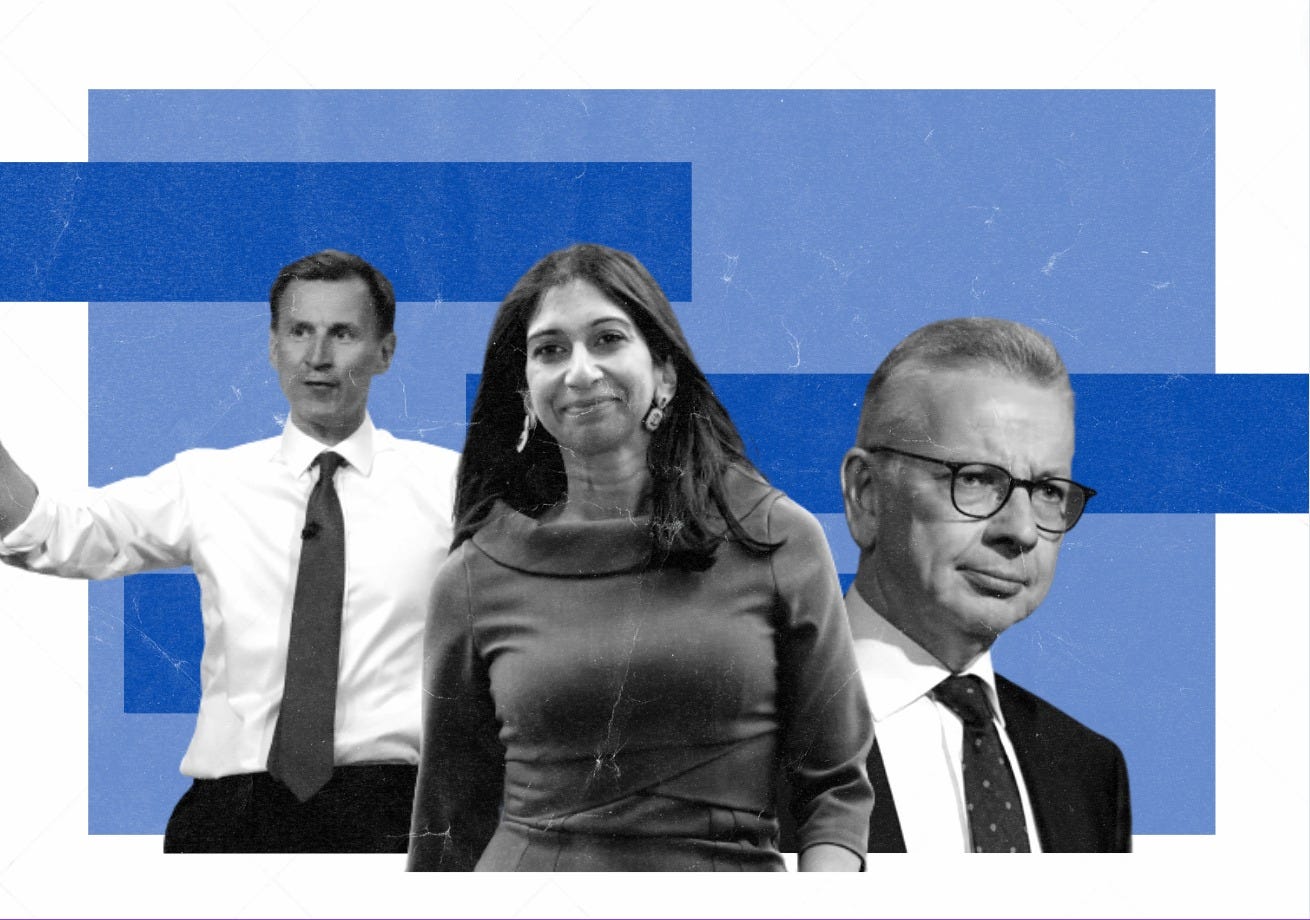Boring is Back: Sunak's Cabinet Analysed
Rishi Sunak picks a cabinet full of experience in his bid to end the political chaos
Reuniting the Government
A week is a long time in politics. But so is a weekend, or even a day if you are unlucky enough to be Nadhim Zahawai, the now Conservative Party chairman who endorsed Boris Johnson and Rishi Sunak for prime minister in the same day.
It is without doubt that this was not the self-professed “chief operating officer’s” greatest moment of political savviness. However, for all Zahawai’s political missteps, they didn’t cost him a place in Sunak’s new and emboldened ‘unity’ cabinet.
Sunak’s reshuffle sought to not repeat the same mistakes as his predecessors. Truss’ cabinet was full of inexperienced ideologues; whilst Boris’ cabinet was a nest for flamboyant and provocative personalities. It is no coincidence that Nadine Dorries and Sunak don’t see eye-to-eye, with the former promoting the vindictive narrative over the summer that it was the former chancellor of the exchequer who was to blame for the ‘coup’ against Boris. In reality, the ‘coup’ was very much one of Boris’ own making (see SOP#7).
When Sunak spoke of uniting “our country, not with words, but with action” after meeting the King, it is hard not to interpret these words as anything less than a veiled swipe at Boris’ ability to command popular support simply by rolling syllables off his tongue. Given the well-publicised hostility between these two, it is ironic Sunak has chosen to bring back many of the ‘big beasts’ who served in cabinet during the Johnson era.
A major error Truss made in the first days of government was putting the axe to the Conservatives’ 2019 manifesto. This was the only mandate the electorate had given the Tories for governing. They had not voted for Jacob Rees-Mogg’s plan to lift the ban on fracking, and nor had they consented to incredulous tax cuts for the top one percent (see SOP#10).
Sunak’s decision to bring back ministers who were still reminiscing the ‘good-old-days’ when they sat behind the top table, is his recognition of the political importance in keeping to their manifesto commitments.
Yes, at first glance the new cabinet gives off a whiff of managerialism. Its members are sensible in that what you see, is what you get. There are few great rhetoricians, there is little flair and nobody who imbues you with excitement.
The greatest challenge Sunak faces is ensuring these ministers do “deliver, deliver, deliver”, to borrow Truss’ unimaginative slogan from her first and last speech as party leader at the Conservative Party conference.
What must be most depressing for Truss about the circumstances surrounding her departure from Office is that it has led to vocal critics of her disastrous ‘mini-budget’ returning to frontline politics.
The Appointments
The reshuffle was not surprising; despite many Twitter users expressing disappointment that Sunak chose to re-appoint politicians regarded as ringleaders for the ‘libertarian right’. Putting together a ‘unity’ cabinet was a far more gargantuan task than simply rewarding the MPs who supported Sunak’s leadership campaign. He had to strike the right balance which meant keeping loyalists happy, appeasing the ERG and appointing ministers with a history of competency in government.
Jeremy Hunt’s reappointment as chancellor of the exchequer was expected. Aside from those in the City who hedged bets against the pound, Hunt was the only winner from the UK’s experiment of Trussonomics.
The Labour Party may well join Hunt…but that remains to be seen. Sacking Hunt would have caused greater instability and spooked the markets before Halloween. Hunt was a strong supporter of Sunak’s leadership campaign during the summer so keeping the former head boy of Charterhouse in post was no real concession.
Michael Gove’s return to the Department for Levelling Up, Housing and Communities is another nod from Sunak to the high value he places on experience. Gove, referred to as the ‘snake’ by a No10 spokesperson in the final hours of Boris’ government, has now served under four Conservative prime ministers and only left the cabinet table for a mere 111 days.

He is known to be well-liked by civil servants and his return shows Sunak has no intention of ditching the Levelling-Up agenda. It was notable that Truss failed to mention Levelling Up once in her first speech as prime minister outside No10, whilst in contrast Sunak spoke of “levelling up and building an economy that embraces Brexit opportunities.”
Truss’ willingness to ditch the Levelling Up agenda would only have led to an electoral wipe-out in the Red Wall constituencies, which helps explain why the 1922 Committee acted in such haste to remove a PM who had quickly become an electoral liability.
Gove’s swift return guarantees the safety of the Renters’ Reform Bill, which provides tenants with greater protection from their landlords by abolishing Section 21 no-fault evictions. The promise to abolish this type of eviction was again in the 2019 manifesto and another policy which Truss sought to drop, before ‘Iron-Lady 2.0’ performed another U-turn. Although this was before Truss had even started to enter the territory of ‘performing U-turns on U-turns’…
Gove’s appearance on the Sunday morning politics shows suggests the minister best known for policy delivery will be at the centre of Sunak’s reforming agenda and far away from the nightclubs of Aberdeen.
Dominic Raabs’ re-appointment as deputy prime minister will certainly not be popular amongst those who still have the UK and US’ withdrawal from Afghanistan in the summer of 2021 fresh in their minds. Raabs’ decision to go on holiday when Kabul was falling to the Taliban means his reputation is beyond tarnished in the eyes of many. However, his return assures Sunak he has a dedicated ally in his cabinet.
Raab very publicly batted for Sunak during the leadership contest and was even labelled a “portent of doom” by Truss due to the ferocity of his attacks on her plans for unfunded tax cuts. Criminal barristers will be aghast that Raab has also been given the responsibility of justice secretary once again.
The Bill of Rights Bill is Raab’s political brainchild and was another policy Truss hoped she had binned for good. Previously in the House of Commons, Raab has described the Bill’s objective as to “reinforce quintessential UK rights” which sounds very ominous and vague. Critics suspect it will lead to a watering down of rights enshrined in the 1998 Human Rights Act.
No analysis of the ‘unity’ re-shuffle would be complete without touching upon the most contentious appointment. In a move which looked hypocritical, Sunak appointed Suella Braverman as Home Secretary after he pledged his government would ‘have integrity, professionalism and integrity at every level’. It was only on Wednesday, the week before, that the darling of the ‘right’ in the parliamentary party was forced to resign by Truss for a ‘minor’ security breach. In Braverman’s resignation letter she admitted “I have made a mistake”, although re-appointing Braverman may not be a mistake on Rishi’s part.
The culture wars, essentially arguments about tofu, are going to dominate the narrative of the next general election campaign, and it is politically expedient for Sunak to have someone in cabinet who will not be afraid to make political clamours about the so-called “wokerati”.


The refugee crisis is a very important issue for many voters in Red Wall seats and appointing a Home Secretary who has a very hard-line and defined position on the crisis may reap political rewards in the long run.
However, with the Sunday Times reporting that Braverman “ignored advice over illegally detained” asylum seekers it may not be too long until the Home Secretary is penning another resignation letter. When Priti Patel served as Home Secretary it was unimaginable to believe the next home secretary would be more unpopular amongst both civil servants and the press. After the Sunday Times found the incumbent is nicknamed “Suella Cruella”, it seems Braverman is setting lots of new records, although not necessarily ones you would want to put your name to.
The only other eye-catching appointment was keeping Penny Mordaunt as Leader of the House of Commons as opposed to promoting her to a more high-profile ministerial position such as Foreign Secretary. The decision to not give Mordaunt one of the great offices of state but to keep her inside the ‘tent’ was politically astute.
Sunak is likely conscious of the fact Mordaunt would not have hesitated to take the leadership contest to the party’s members if she had successfully obtained 100 nominations from MPs.
However, Sunak has not adopted the mantra “Keep your friends close and enemies closer” but has more so decided to keep his friends closer and enemies in sight. Rewarding Mordaunt with one of the great offices of state could have made him potentially vulnerable to the same fate as Boris and Truss were she to resign in the event of a scandal or government crisis.
Sunak’s re-shuffle was not comparable to Harold Macmillan’s “Night of the Long Knives” in terms of drama, and there was little retribution for ministers such as James Cleverly, who openly endorsed Boris Johnson. However, it did mark the return of a style of politics which has been noticeably absent for a while.
Being sensible and boring is back.
Follow Ed on Twitter @EdHalford1 and view his other work on edhalford.co.uk






